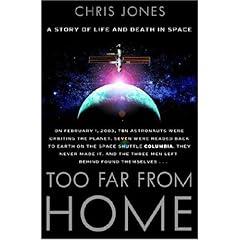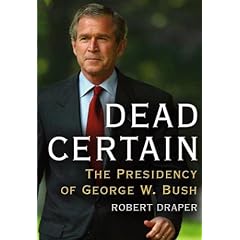 Chris Jones is one of the best writers you have never heard of. A writer for Esquire, Jones wrote an unforgettable feature on Ricky Williams a few years ago and this book is based off an award-winning article. In the wake of the Columbia disaster, NASA's fleet was grounded. One small problem: there were three astronauts living on the International Space Station who needed to be brought home.
Chris Jones is one of the best writers you have never heard of. A writer for Esquire, Jones wrote an unforgettable feature on Ricky Williams a few years ago and this book is based off an award-winning article. In the wake of the Columbia disaster, NASA's fleet was grounded. One small problem: there were three astronauts living on the International Space Station who needed to be brought home.
This book tells an incredible story about those astronauts -- in some ways, you could see an Apollo 13-style movie being produced based on that story -- but it isn't what made the book so good. It put that drama in the context of the entire space program. It illustrated how our astronauts have changed from the swashbuckling ace pilots to science geeks like Don Pettit. And even in the light of that change, we still look like Chuck Yeager compared to the Russian cosmonauts, who are in many ways robots. Nikolai Budarin, the cosmonaut on the ISS, said his favorite hobby was "picking mushrooms." Can you see an American astronaut saying that? Context is what makes this book.
For better or for worse, you can see the Tom Wolfe influence on the material. But even for people who are generally disinterested in science and space, Jones does a superb job.
Best Out of Print Book About Politics I Read This Year:
The Ambition and the Power by John Barry

TANGENT ALERT: I love any place that sells used books. I make a point to wander around the local used bookstore, a place that is heaven to me. It features books all over the place, like a tornado hit a library and they never got back around to filing the books by Dewey Decimal system, just throwing them wherever they may land. The owner is a classic music-listening, slightly cranky book snob who lights up when you ask him about books or politics or anything else he finds interesting. But I digress; you can find good books even in places like Goodwill, where I found this tome. END TANGENT.
If I taught a class about Congress or legislative politics, this book would be required reading. While the book is supposed to be about former Speaker of the House Jim Wright -- who has turned out to be largely forgotten -- it is really a book about how the House of Representatives works. Barry was given incredible access -- the general rule was that if staff could be there, so could he -- and he interviewed everyone, even Newt Gingrich, the man who brought Wright down. Most books that promise to tell you how Congress really works are nothing more than warmed over diatribes about how Congress is in the pocket of (insert name of corporation or lobbying group or special interest). This shows how personality and trust and power are the currency of the House. Had there been blogging in 1989, I would would have blogged about this book endlessly. If you get a chance, get your hands on a copy.
Best Book About The Bush Administration
Dead Certain: The Presidency of George W. Bush by Robert Draper
 I will preface this by saying that I haven't read Charlie Savage's book, Takeover, which I hear is amazing.
I will preface this by saying that I haven't read Charlie Savage's book, Takeover, which I hear is amazing.Draper comes the closest of any book/article of figuring out what makes Bush tick. Fair-minded observers would have to conclude that the President is not a dumb man. A graduate of Harvard and Yale, Bush can immerse himself in policy (despite his "Is our children learning?" gaffe, he can sound downright wonkish on education policy). In the end, the President has proven to be the exact opposite of his father. Bush pere was a master of the details, but lacked the "vision thing." His son loves the idea of the grand vision (converting Iraq into a democratic secular society, going to Mars, etc.) but is uninterested in the details. Draper never quite gets Bush completely. I don't know if anyone will ever write the definitive piece to get at the heart of Bush, but when they do, they will rely on ancedotes from this book.
The book also shows how the White House works behind the facade. Rove might be Bush's Brain, but the President is not a Manchurian candidate beholden to his whims. Rove didn't want Cheney (picking an old foreign policy hand was not exactly the best way to align Bush as the agent of change) and didn't like the Miers pick. Well worth your time.
Best Non-Fiction Book That Reads Like Fiction:
It Never Rains in Tiger Stadium by John Ed Bradley
If Everybody's All-American was about the ex-player who couldn't move past football, this book is about his polar opposite. Everybody's All-American was about the ex-player who gets the question, "What was it like playing for LSU?" and revels in telling the war stories as a desperate way to connect to his glory days. It Never Rains is about the ex-player who mumbles a few words and tries to change the subject.
Bradley, an one-time 2nd team SEC center for LSU and accomplished writer, couldn't get away from football fast enough. He shunned old coaches and teammates and stayed away from the program generally because the experience was so powerful that, like dueling magnets, it pushed him away. It feels like a novel -- Bradley does not make himself out to be a hero, instead settling on something more along the lines of a highly coordinated tormented artist. There are times when that gets a bit old, but his journey to reconnect with coaches and teammates and come to grips with his career is moving. Toss in a relationship with a woman that his parents disapprove of and you have the makings of a terrific book. A must-read for anyone that was part of a life-defining activity (be it sports, chess team, Boy Scouts, whatever) and coming to grips with it being gone.
Best Book That Was Turned Into a Movie That I Haven't Seen (Yet)
Into the Wild by Jon Krakauer

It is the universal dream. Nearly every man, regardless of situation, personality or opportunity, will dream of spending their life living off the land. Stubble growing on their weathered face as they hunt and fish and grow food away from civilization; just them and God's majestic Earth. It's a way to escape their problems or to grow closer to nature or to enjoy some romantic ideal of manhood. For nearly every man, it is just a passing thought, an enjoyable dream akin to daydreaming about owning your own bar or writing the Great American Novel.
Chris McCandless is not your average guy. He reminds me a lot of Pat Tillman. Both are free-spirits who reject many of society's conventions and seek out life. Tillman quit football to enter the Marines and be part of something larger than himself. In an odd way, McCandless hitchhiked across the country, ending up in Alaska to find that same thing: that sense of something larger than himself. Woefully unprepared to live the way he did, his story is a tragic one. But Krakauer makes sure that it is also completely unforgettable.
Best Book That I Fear Will Be Turned Into An Awful MovieThe Tender Bar by J.R. Moehringer

There are so many ways this book could fall into caricature when the requisite movie is made. The denziens of the bar will be turned into one-dimensional punching bags -- comic relief gone awry. The dysfunction of his family will be mined for laughs without the underlying sadness. His stuttering grandfather will be a martinet without showing his times of greatness and complexity.
This is a memoir about a boy whose father is long gone -- The Voice as a radio deejay -- and whose mother has her hands full just keeping food on the table and rent in the landlord's pocket. His grandfather is miles away from being a pleasant person and his grandmother can only be described as long suffering. Uncle Charlie, a barkeep, and the rest of the patrons at Publicans end up teaching J.R. about being a man and serving as a male presence in his life. It's hiliarious without being imperceptive, sentimental without being maudlin and insightful without being overbearing. The book is nearly perfect and given the small margin for error, I fear what Hollywood would do to it.

